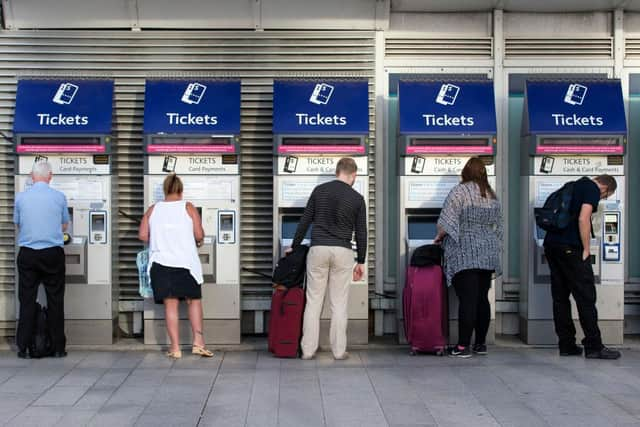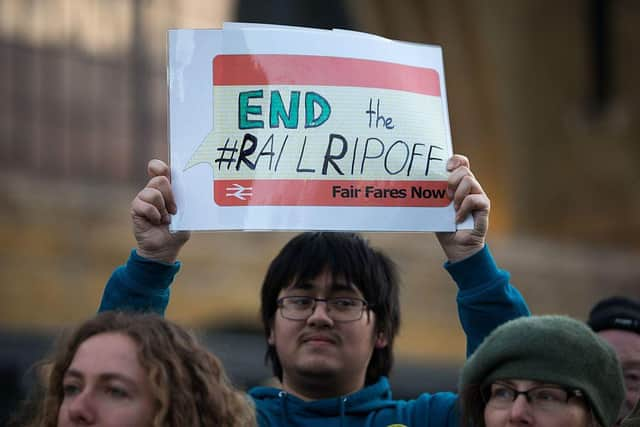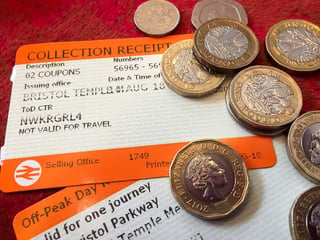Rail fares increase: when do train ticket prices go up in 2021, by how much - and are season tickets affected?
and live on Freeview channel 276
The Department for Transport (DfT) has announced rail passengers are to be hit by an above inflation fares rise for the first time in eight years, a move which has been criticised by industry experts as “extortionate and plain daft”.
Since January 2014, governments have linked rail fare rises to the Retail Prices Index (RPI) measure of inflation. But in 2021, ticket prices will increase by an average of 2.6 per cent, which is the RPI, plus 1 per cent.


Here is everything you need to know.
When will rail fares increase?
Advertisement
Hide AdAdvertisement
Hide AdUsually, annual increases in rail fares come into effect on the first working day of the New Year, which in 2021 would be Monday 4 January.
However, this time around the rise has been delayed until 1 March.


Rail minister Chris Heaton-Harris said delaying the annual fares rise “ensures passengers who need to travel have a better deal this year”.
Why are fares increasing?
The DfT said the policy of linking rail fare rises to the measure of inflation has been axed due to the “unprecedented taxpayer support” handed to the rail industry over the past 12 months.
Advertisement
Hide AdAdvertisement
Hide AdDespite the increase in rail fares being above inflation, 2021 will see the lowest actual increase for four years.
The Government took over rail franchise agreements from train operators in March, following the collapse in demand for travel caused by the virus crisis, a move which is expected to have cost around £10 billion by mid-2021.
Mr Heaton-Harris said: “By setting fares sensibly, and with the lowest actual increase for four years, we are ensuring that taxpayers are not overburdened for their unprecedented contribution, ensuring investment is focused on keeping vital services running and protecting frontline jobs.”
The Rail Delivery Group – which represents train operators – says 98p of every £1 spent on train fares goes towards running and maintaining services.
How will the price change affect me?
Advertisement
Hide AdAdvertisement
Hide AdThe 2.6% figure announced by the department relates to ‘regulated’ fares, which make up around half of fares and include season tickets on most commuter routes, and is the lowest increase since 2017.
But operators are expected to match their rises in ‘unregulated’ fares – such as Advance tickets – because the Government has taken on their financial liabilities.
Examples of the potential impact include a Brighton-London annual season ticket going up by around £129 to £5,109 and a Manchester-Glasgow off-peak return rising by £2.30 to £90.60.
In Scotland, ScotRail have said it is “currently considering” its position on the fares increase.
Advertisement
Hide AdAdvertisement
Hide AdBut if it were to fall in line with the rises, the price of a 12-month season ticket between Edinburgh and Glasgow could increase by £109 to £4,309, while a season ticket between Tweedbank and Edinburgh would rise by £75 to £2,975.
Jacqueline Starr, chief executive of the Rail Delivery Group, acknowledged that “passengers will be disappointed” about the rise, adding that “governments must ultimately decide the balance between how much fare payers and taxpayers pay to run the railway”.
Manuel Cortes, general secretary of the Transport Salaried Staffs’ Association, described increasing prices by more than inflation as “extortionate and plain daft”.
He continued: “Given the massive economic fallout from the virus, the last thing we need to see is a kick in the teeth for passengers.”
Is there any way of avoiding the fare rise?
Advertisement
Hide AdAdvertisement
Hide AdTo avoid the rail fare increase, savvy commuters can renew their season tickets in the days before the annual increase; passengers can also save money by getting a railcard, travelling off-peak and booking in advance, although these options are not available for many journeys, particularly those made by commuters.
Meanwhile, the DfT has written to all train operators to begin immediate work on developing flexible season tickets, allowing people who travel two or three days a week to save money compared with buying daily tickets.
Firms have been told these must be introduced across England by the end of next year.

